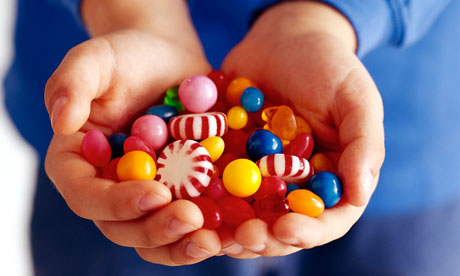
Fags and alcohol are old killers, old stories. I prefer to speak of sugar, the sweeter demon. Sugar, scientists now agree, is addictive. This does not mean, as the rightwing press would say, that weak people eat themselves into immobility from choice or an existential mini- roll-themed death wish; it means that it affects the neural pathways in consumer brains and makes them want more, even against their judgment.
The way in which addiction works is too complex for an ad campaign, but it means that "choice" – ever the buzzword of the libertarian – is removed. Unfettered marketing is skilled at pretending to offer more choice, and it does – more choice of junk – and for the dull reason that processed food is more profitable than unprocessed food. The sugary food goes by the tills, where we all pass; to buy goods in Tesco Metro you must walk down a wall of sugar and engage in a kind of silent, Mexican standoff with an Easter egg.
Global consumption of sugar has tripled in the last 50 years, creating an obesity pandemic. Even so, there are no posters of sugar-smeared children sitting in gutters looking vague. The poisonous effects of tobacco are at least acknowledged, and semi-legislated for, to the extent that a report recently said that smokers feel unloved. This is ridiculous. No one hates a smoker like a smoker, and I say this as a smoker.
But sugar and its best friend, fat, are explicitly marketed at children, and fat toddlers become fat adults, drains on the state, Jeremy Kyle guests and, eventually, bed-blockers. That the poor are disproportionately affected, due to food deserts, budgetary restrictions and bad information, is both obvious and maddening.
Six out of 10 British adults and three in 10 children (aged two to 15) are overweight. We are already the fattest people in Europe and rising. In the year of the London Olympics you might expect more than a government dedicated, by its inaction, to making fat people even fatter. But let that be our Olympic pledge.
The Tory government loves deregulation; it is its robotic default mechanism. Its plan to lie there, gob open, and let the food lobby waddle rampantly was exposed as early as 2008, when Andrew Lansley – then shadow secretary of state for health – made Dave Lewis, the chair of Unilever (Ben and Jerry's, Pot Noodle, Carte D'Or), the chair of the Conservative public health commission. This is as mad as asking crack dealers to ponder ways of making people smoke less crack, but this has long been a government beyond irony.
I almost want to stop here, because detailing the ways in which the food lobby does not try to stop us eating sugar and fat – even while claiming it wants to – is depressing. It feels like having one of those conversations with someone who you know is insane, but who wants to be rude? So onwards!
Out came the usual rhetoric: policy would be "built on social responsibility, not state regulation"; there would be no "top-down lectures", because removing addictive foods from consumer eyelines, or asking companies to tell their customers how toxic their products really are, is presumably an act of grotesque snobbery; let them choose death, if they wish it.
There is also the meaningless Responsibility Deal, where food companies sign various pledges voluntarily if they want to, even though the charity Sustain has pointed out that they either don't sign up, sign up for pledges that don't apply to them, or have diluted the pledges so much they mean nothing. Major health charities (Diabetes UK, the British Heart Foundation) are so disgusted that they refuse to be involved.
Lansley has said that he wants to remove 5bn calories a day from the nation's plates, but this seems like an idle dream, and dreams are cheap these days – although it brought forth a gag from Terence Stephenson, president of the Royal College of Paediatrics and Child Health. He called it "actually peanuts – 16 dry roasted peanuts per person". The Responsibility Deal and its useless sister, Change4Life, amount to nothing but cheap and positive marketing for Big Food.
What now? There has been another victory for Big Food. Some products are considered too unhealthy to advertise on children's TV, but there is always online, where marketing can be even more insidious. Big Food is skilled at enticing children on to computers, with infant pleasures. Kellogg's has Krave superheroes. Chupa Chups has Chuck, a gormless gonk. Nesquik has a bunny rabbit. Here, sugar is a child's best friend. Here, children meet cartoon characters that will take them on an adventure to obesity, giving them gifts along the way.
• Follow Comment is free on Twitter @commentisfree

